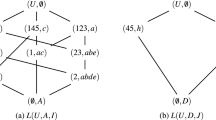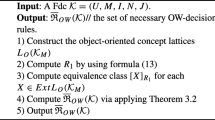Abstract
Attribute reductions is an important topic in formal concept analysis. The existing attribute reduction approaches are dominated by global reductions and there is very limited investigation on local reductions. This paper is devoted to the study of decision rule specific reduction for formal decision context and concept specific reduction for formal context. The notion of decision rule specific reduction is proposed and the related reduction methods are presented. The relationships between existing reduction approaches and decision rule specific reduction approaches are analyzed. Accordingly, we make an analysis of attributes based on three-way classification by using reductions. Furthermore, the notion of concept specific reduction for formal context is proposed and the concept specific reduction methods are examined. The relationship between concept specific reduction and decision rule specific reduction is surveyed.


Similar content being viewed by others
References
Belohlavek R, Vychodil V (2006) Formal concept analysis with constraints by closure operators. LNAI 4068:131–143
Beydoun G (2009) Formal concept analysis for an e-learning semantic web. Expert Syst Appl 36(8):10952–10961
Carpineto C, Romano G (2004) Exploiting the potential of concept lattices for information retrieval with CREDO. J UCS 10(8):985–1013
Chen DG, Tsang EC (2005) On the local reduction of information system. LNCS 3930:588–594
Chen DG, Zhao SY (2010) Local reduction of decision system with fuzzy rough sets. Fuzzy Sets Syst 161:1871–1883
Dias SM, Vieira NJ (2015) Concept lattices reduction: definition, analysis and classification. Expert Syst Appl 42:7084–7097
Elloumi S, Jaam J, Hasnah A, Jaoua A, Nafkha I (2004) A multi-level conceptual data reduction approach based on the lukasiewicz implication. Inf Sci 163:253–262
Formica A (2010) Concept similarity in fuzzy formal concept analysis for semantic web. Int J Uncertain Fuzz Knowl Based Syst 18(2):153–167
Formica A (2012) Semantic web search based on rough sets and fuzzy formal concept analysis. Knowl Based Syst 26:40–47
Ganter B, Wille R (1999) Formal concept analysis: mathematical foundations. Springer, Berlin
Klimes J (2014) Using formal concept analysis for control in cyber-physical systems. Proced Eng 69:1518–1522
Konecny J (2017) On attribute reduction in concept lattices: methods based on discernibility matrix are outperformed by basic clarification and reduction. Inf Sci 415:199–212
Kuznetsov SO (2001) Machine learning on the basis of formal concept analysis. Autom Rem Control 62(10):1543–1564
Kuznetsov SO (2004) Complexity of learning in concept lattices from positive and negative examples. Discret Appl Math 142:111–125
Li JH, Mei CL, Lv YJ (2011) Knowledge reduction in decision formal contexts. Knowl Based Syst 24:709–715
Li JH, Mei CL, Lv YJ (2012) Knowledge reduction in real decision formal contexts. Inf Sci 189:191–207
Li JH, Mei CL, Lv YJ (2012) Knowledge reduction in formal decision contexts based on an order-preserving mapping. Int J Gener Syst 41:143–161
Li JH, Mei CL, Wang J, Zhang X (2014) Rule-preserved object compression in formal decision contexts using concept lattices. Knowl Based Syst 71:435–445
Li JH, Huang C, Mei CL, Yin YQ (2017) An intensive study on rule acquisition in formal decision contexts based on minimal closed label concept lattices. Intell Autom Soft Comput 23:519–533
Li JH, Kumar CA, Mei CL, Wang XZ (2017) Comparison of reduction in formal decision contexts. Int J Approx Reason 80:100–122
Li JY, Wang X, Wu WZ, Xu YH (2017) Attribute reduction in inconsistent formal decision contexts based on congruence relations. Int J Mach Learn Cybern 8:81–94
Liu GL, Hua Z, Zhou JY (2018) Local attribute reductions for decision tables. Inf Sci 422:204–217
Outrata J, Vychodil V (2012) Fast algorithm for computing fixpoints of Galois connections induced by object-attribute relational data. Inf Sci 185:114–127
Pawlak Z (1982) Rough sets. Int J Comput Inf Sci 11:341–356
Pei D, Mi JS (2011) Attribute reduction in decision formal context based on homomorphism. Int J Mach Learn Cybern 2:289–293
Pineda-Bautista BB, Carrasco-Ochoa JA, Martinez-Trinidad JF (2011) General framework for class-specific feature selection. Expert Syst Appl 38:10018–10024
Poelmans J, Elzinga P, Viaene S, Dedene G (2010) Formal concept analysis in knowledge discovery: a survey. In: International conference on conceptual structures, pp 139–153
Ren RS, Wei L (2016) The attribute reductions of three-way concept lattices. Knowl Based Syst 99:92–102
Sampath S, Sprenkle S, Gibson E, Pollock L, Greenwald AS (2007) Applying concept analysis to user-session-based testing of web applications. IEEE Trans Softw Eng 33(10):643–658
Shao MW, Li KW (2017) Attribute reduction in generalized one-sided formal contexts. Inf Sci 378:317–327
Shao MW, Leung Y, Wu WZ (2014) Rule acquisition and complexity reduction in formal decision contexts. Int J Approx Reason 55:259–274
Shao MW, Yang HZ, Wu WZ (2015) Knowledge reduction in formal fuzzy contexts. Knowl Based Syst 73:265–275
Skowron A, Rauszer C (1992) The discernibility matrices and functions in information systems. In: Slowinski R (ed) Intelligent decision support, handbook of applications and advances of the rough sets theory. Kluwer Academic, Dordrecht, pp 331–362
Wei L, Qi JJ (2010) Relation between concept lattice reduction and rough set reduction. Knowl Based Syst 23:934–938
Wei L, Qi J, Zhang W (2008) Attribute reduction theory of concept lattice based on decision formal contexts. Sci China Ser F Inf Sci 51(7):910–923
Wille R (1982) Restructuring lattice theory: an approach based on hierarchies of concepts. In: Rival I (ed) Ordered sets. Springer, Dordrecht, pp 445–470
Wu WZ, Leung Y, Mi JS (2009) Granular computing and knowledge reduction in formal contexts. IEEE Trans Knowl Data Eng 21(10):1461–1474
Yao Y (2004) A comparative study of formal concept analysis and rough set theory in data analysis. In: International conference on rough sets and current trends in computing, Springer, pp 59–68
Yao Y, Zhang XY (2017) Class-specific attribute reducts in rough set theory. Inf Sci 418:601–618
Zhang ML, Wu L (2015) LIFT: multi-label learning with label-specific features. IEEE Trans Pat Ana and Mach Intell 37:107–120
Zhang WX, Qiu GF (2005) Uncertain decision making based on rough sets. Publishin of Tsinghua University, Beijing
Zhang W, Wei L, Qi J (2005) Attribute reduction theory and approach to concept lattice. Sci China Ser F Inf Sci 48(6):713–726
Acknowledgements
This work has been partially supported by the National Natural Science Foundation of China (Grant nos. 61473239, 61372187).
Author information
Authors and Affiliations
Corresponding author
Additional information
Publisher’s Note
Springer Nature remains neutral with regard to jurisdictional claims in published maps and institutional affiliations.
Rights and permissions
About this article
Cite this article
Qin, K., Lin, H. & Jiang, Y. Local attribute reductions of formal contexts. Int. J. Mach. Learn. & Cyber. 11, 81–93 (2020). https://doi.org/10.1007/s13042-019-00956-z
Received:
Accepted:
Published:
Issue Date:
DOI: https://doi.org/10.1007/s13042-019-00956-z




